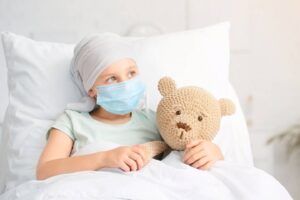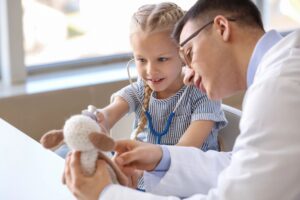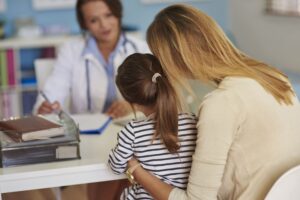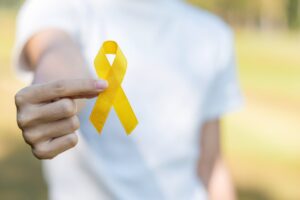
Diagnosis and confirmation of the diagnosis
What are the statistics of disease and recovery?

Childhood cancer is a rare disease, accounting for about 1% of all cancer cases. The World Health Organization (WHO), as part of the Global Initiative for Childhood Cancer, notes that approximately 300,000 cases of childhood cancer are diagnosed worldwide each year. The most common forms of cancer are leukemia (approximately 30% cases), brain tumors (20-25%), and lymphomas.
Every year, approximately 1000 new cases of childhood cancer are diagnosed in Ukraine. This corresponds to an average of 15-20 cases per 100,000 children.
Thanks to the development of modern medicine, more and more children are overcoming cancer. In developed countries, 80-85% children recover after timely and effective treatment.
In the context of pediatric oncology, "cure" usually means achieving a stable remission - that is, no signs of the disease for a long time after treatment. Most often, doctors focus on the 5-year survival rate: if the cancer does not return within five years of diagnosis, the child is considered to be cured.
However, this figure depends on many factors:
- type of cancer;
- stage of the disease at the time of diagnosis;
- the general condition of the child;
- access to quality medical care.
The survival rate in Ukraine is lower than in developed countries, at around 50-60%, due to limited access to modern treatments, late diagnosis, and insufficient funding for cancer programs.
Should I see several doctors to confirm the diagnosis?

Yes, seeking a second opinion is quite appropriate, especially if the diagnosis is rare, the results of examinations are ambiguous, or the proposed therapy plan raises doubts among parents.
Consultations with several specialized specialists, such as pediatric oncologists or hematologists, help to clarify the diagnosis and formulate an optimal treatment plan.
For example, the results of examinations such as biopsy, computed tomography (CT), or magnetic resonance imaging (MRI) can be interpreted differently depending on the experience of a particular doctor. That is why it is important to visit specialized medical centers that have experience working with children with cancer. Pediatric oncology differs significantly from adult oncology both in terms of tumor types and treatment methods.
Parents have several ways to get a second opinion, depending on their resources, where they live, and their particular situation. Here are the main options:
1. Through a referral from your doctor
How it works:
Ask your oncologist or pediatrician to refer you to another specialist within your city or country. For example, if you are being treated at a local hospital, you can contact National Children's Specialized Hospital "Okhmatdyt", National Cancer Institute in Kyiv or the Clinical Center for Pediatric Medicine in Lviv and PThe first territorial medical association in Lviv.
Pros.free of charge within the framework of state medicine, quickly organized.
ConsThe choice of doctors is limited, and not all specialists are willing to make referrals.
2. International platforms and clinics
How it works:
You can contact foreign clinics directly or through special platforms:
Medisapiens, Bookimed, DocLand are online services for finding doctors and clinics abroad (Israel, Germany, Turkey). You upload documents and receive a written response.
Direct appeal to clinics (Ichilov, Charité, St. Jude) - send a request through the website, consult online (usually for a fee - from $300 to $500).
Please also read the information about medical evacuation and Medevac program.
Pros.access to global experience, innovative approaches.
ConsHigh cost, need to know English or have a translator.
3. Personal contacts and references
How it works:
Ask parents who have already undergone treatment or to communities on Facebook, Telegram. They can often recommend a specific doctor or clinic.
Pros.: live reviews, quick search.
ConsSubjectivity of recommendations, not always confirmed qualifications.
Practical tips
DocumentsCollect all medical data in digital form (tests, histology, MRI/CT, extracts).
Language.If you are applying abroad, translate the documents into English or the language of the country.
TimeDo not delay - a second opinion is most effective before treatment.
Finance.Find out whether the costs are covered by the foundation, the state, or you have to pay for them yourself.
What to do after receiving a second opinion
Compare it to the original treatment plan. Discuss both opinions with a trusted doctor so that you can decide on the best course of action for your child.
What questions are important to ask the doctor during the visit?

Preparing for a conversation with a doctor helps you better understand your child's condition, the plan of action, and possible risks. Here is a list of key questions to ask:
- What is the exact diagnosis and stage of the disease?
- What additional examinations are needed to confirm or clarify the diagnosis?
- What treatment plan was proposed and why was this approach chosen?
- What are the chances of recovery? What factors affect the prognosis?
- What are the possible side effects of treatment?
- What is the approximate duration of therapy?
- Are there any alternative treatments or opportunities to participate in clinical trials?
- How often do I need to take tests or undergo control examinations?
- What actions should be taken in case of an emergency (e.g., high fever, bleeding)?
Write down the doctor's answers to help you remember everything. It's hard to remember everything during a consultation - especially when it comes to important medical decisions. So you should:
- Write down key points in a notebook or notebook.
- Record on a voice recorder or phone.
Important to know:
In Ukraine, you have the right to record a conversation if you are a party to it. The law does not prohibit this. However:
- You cannot publish the recording or pass it on to others without the doctor's permission, as this may violate his or her right to privacy or medical confidentiality.
- It's best to warn your doctor about the appointment - it's ethical and builds trust.
Are traditional methods of cancer treatment effective?

No, folk methods such as the use of herbs, tinctures, mushrooms, soda, etc. have no scientifically proven effectiveness in the treatment of cancer. No reputable medical study has confirmed that these products can cure cancer or replace mainstream treatment.
Sometimes such methods can yield a sense of psychological reliefHowever, they do not affect the course of the disease. Moreover, some folk remedies are dangerousThey can be toxic, cause allergic reactions, or interact with chemotherapy drugs, increasing their toxicity or reducing their effectiveness.
A child's cancer diagnosis is a huge stressor. In such a situation, parents often look for additional support or an alternative to formal treatment. Traditional medicine may seem attractive, but it is important to understand the risks.
What makes you look for an "alternative"?
- Fear. The side effects of chemotherapy (nausea, hair loss, weakness), the complexity of treatment, and the unknown all cause anxiety. Traditional methods look "natural" and less scary.
- Loss of trust. Sometimes families face delays in treatment, lack of information or funds. If it seems that medicine does not help, they are tempted to turn to "witch doctors".
- Fatigue. Treatment can take months. Constant pain, tests, hospitalizations - all this is exhausting. People are looking for ways to "support the body," especially when they are exhausted.
- The influence of the environment. Friends, relatives, or the Internet may advise "grandmother's recipes," and stories of "miraculous healing" sound convincing, especially in desperation.
Folk methods are not an alternative, but a potential threat!
For a child with cancer, any self-medication is a serious risk. Many herbs or "natural" remedies can:
- interfere with the effect of chemotherapy;
- have toxic components;
- cause allergies or side effects;
- create a false impression of "improvement," wasting valuable time.
What should you do if you are advised to undergo a "folk" treatment?
- Feel free to discuss this with your doctor. Ask if it is safe to take anything else.
- Do not start any treatment without the consent of your oncologist.
Remember: reliable treatment is not experiments, but evidence-based medicine. It gives a child a chance for recovery.
Our partners
